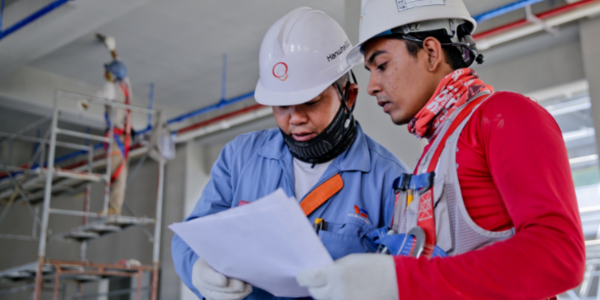There are many reasons why home buyers choose to build new instead of buying an existing property. For some, being able to tailor-make a home that exactly fits requirements, built to specific design and layout preferences is important. While for others, a low maintenance home with the latest innovations in home ventilation, heating and eco-friendly features is a must. Whatever your reasons for building new, it’s important you’re clear on how construction finance will impact your lending ability.

Why build new?
If you’re just starting your new home build journey, you may be considering some of the reasons why building new is right for you. The main benefits of a new build include:
- More control of the layout: In most instances, you’ll have some control over the floor plan, which means you can design a home that fits your requirements both now and into the future.
- Low maintenance: A brand new home requires little to no maintenance, which means you can focus on paying down your mortgage rather than spending your money renovating or replacing tired fixtures and fittings.
- Healthy homes are more economical: Newly built homes must adhere to much stricter codes of compliance and as such are built using the latest innovations in home heating and insulation. Many come with double-glazing, wall, floor and ceiling insulation, as well as smart home systems and economical power connections. All of which save you money and ensure you get a modern, warm and dry home.
- Lower deposit: When buying a new build instead of an existing home, you may only need to save a smaller deposit. And for first home buyers, that could mean getting into a new home much sooner. Talk to a Mortgage Express branded mortgage adviser about the deposit requirements for a new build.
Options for construction finance
Construction lending is quite different to a mortgage on an existing property. And depending on the type of new build you’re buying, the type of construction loan could differ too.
First up, it’s important to be clear on exactly what is included in your new build contract. So have your lawyer go over the details with you before you sign anything. Look out for provisional cost (PC) sums, which are costs that can vary – often quite substantially – as the build progresses and ensure you understand exactly what is and isn’t included.
Here’s a brief outline of the types of construction finance you may be considering:
Turnkey Construction Finance
- A turnkey home is a house and land package where the completed home is ready for you to move into once construction finishes. All details of the build are included in the price - from the driveway to the back door and everything in between! This type of new build is usually offered by larger construction companies or developers, and the price is fixed with very few PC sums.
- In most instances, a turnkey construction loan only requires a 10 per cent deposit, with the lender covering up to 90 per cent of the build contract price. What’s more loan repayments – and interest charges - only start once the property is completed and ready for you to move in.
- Because the builder / construction company / developer carries all of the risk, there is usually a margin built into the price to cover any unexpected costs, which can make turnkey builds more expensive.
Construction Loan
- If you buy land separately and then engage a builder to build a new home on the land for you, you’ll need to apply for a construction loan.
- And while you may have more control over the layout and design of your new home with a construction loan, it’s unlikely you’ll have a fixed price with this type of build. In most cases, build contracts will include several PC sums, for items of the build that could fluctuate in price.
- Payments are made throughout the build process according to a payment schedule, which is usually linked to various stages of construction. That means your loan payments and interest charges begin as soon as you start drawing down the staged payments of your loan, although most lenders will treat this loan as an interest-only loan until the build is completed.
- Before each drawdown and payment to the construction company, your lender may require certification that the build is going according to plan.
- When it comes to a deposit, generally a larger deposit – at least 20 per cent of the build cost – is required but it’s worth discussing your deposit and construction finance options with a Mortgage Express branded mortgage adviser before proceeding with this type of lending.
New build vs. buying existing?
There’s no doubt that building a new home has its advantages, but it’s equally important to be clear on the pitfalls. Before proceeding, seek professional advice from a lawyer with experience in construction finance and lending. Check the credentials of the builder or construction company you’ll be working with. Be realistic about the costs and factor in an allowance for unforeseen expenses. Lastly, engage a Mortgage Express branded mortgage adviser to provide expert financial advice at every step of the way.







